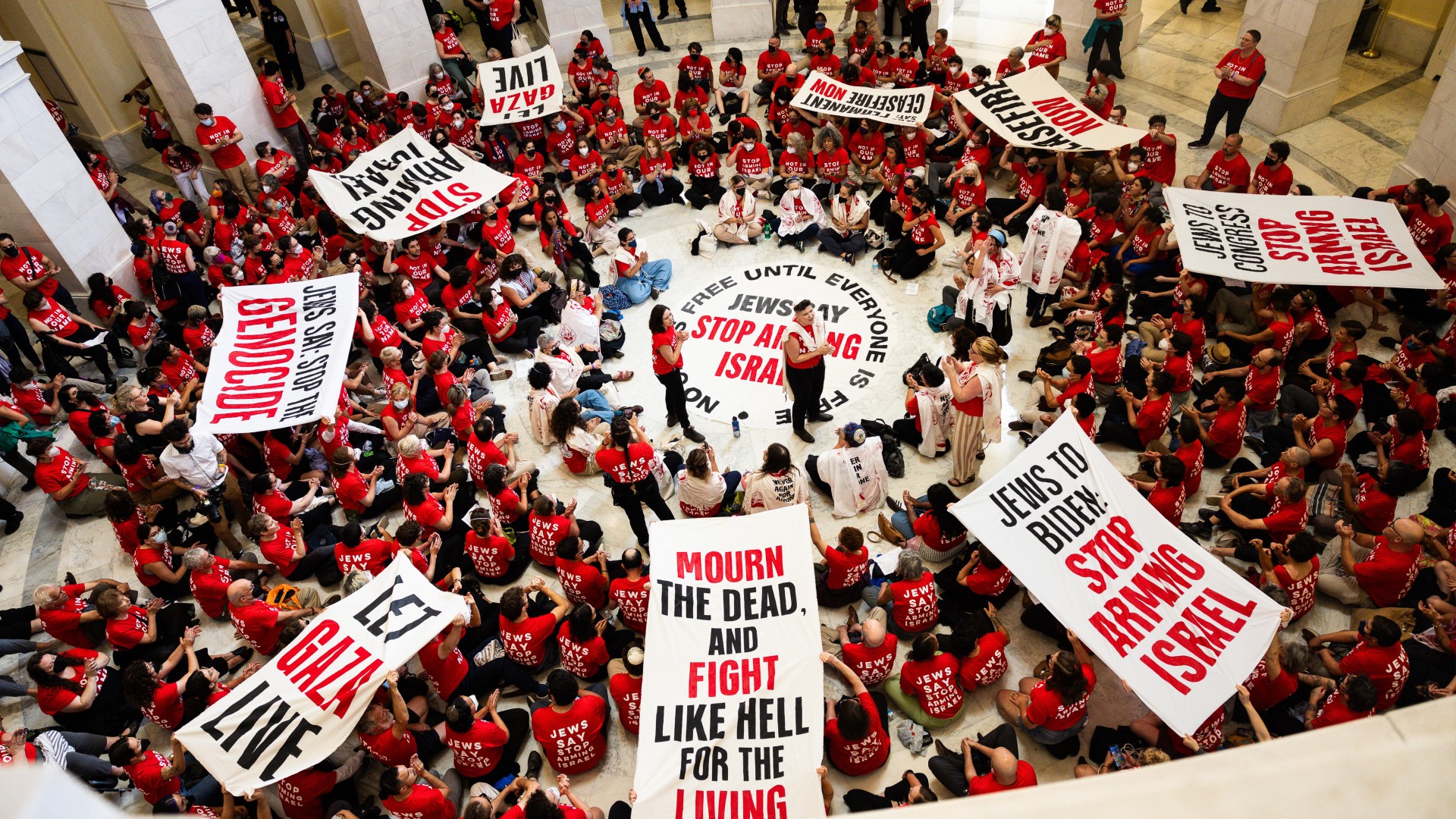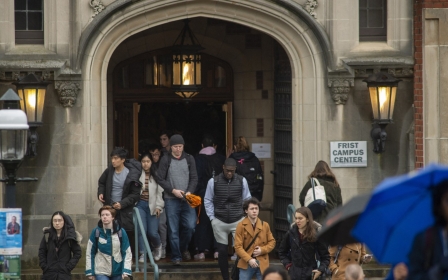'Responsible for a genocide': Jewish-American groups reject Netanyahu visit to US

As pro-Palestinian groups protest against Benjamin Netanyahu's address to a joint seating of Congress on Wednesday, some Jewish- and Israeli-American organisations, including those groups who are ardent supporters of Israel, say they refuse to give an audience to the Israeli leader.
The public rejection of Prime Minister Netanyahu by many mainstream Jewish organisations as he seeks to build more bipartisan support for his war on Gaza underlines the extent to which Netanyahu has fallen out of favour amongst large swathes of Jewish America which see his war policy to be both a failure as well as having caused irreparable damage to Israel's reputation.
Netanyahu’s visit to the US comes as Israel’s war on Gaza enters the 10th month in which close to 40,000 Palestinians have been killed, tens of thousands of others have been maimed and injured, and a million others forcibly displaced and on the constant edge of famine. The embattled Israeli leader is expected to reiterate how Israel is a key US ally and thank President Joe Biden for his support.
Organisations like the liberal Zionist J-Street and Americans for Peace Now, to the expressly anti-Zionist Jewish Voice for Peace have rejected the prime minister's visit while several lawmakers and senators have refused to attend his address.
New MEE newsletter: Jerusalem Dispatch
Sign up to get the latest insights and analysis on Israel-Palestine, alongside Turkey Unpacked and other MEE newsletters
So too, have prominent Jewish legislators - including Bernie Sanders, Jan Schakowsky, and Brian Schatz - who have joined the ranks of the now dozens of Democrats in Congress who have refused to attend Netanyahu’s speech in protest against Israel’s ongoing war on Gaza.
Last week, 230 congressional staffers from 122 Democratic and Republican congressional offices signed a letter calling on lawmakers to boycott the address.
Whereas 58 lawmakers had boycotted Netanyahu's address to Congress a decade prior, the prospect that even more legislators will skip the address seems likely.
The rejection in Congress to Netanyahu's address follows a nationwide effort by many Jewish Americans to protest his visit and his efforts to instrumentalise their identity to conjure support for his policies.
“We’re against Netanyahu’s arrival. For us, the main call right now is to stop the genocide but the long-term is to dismantle the apartheid system and to find a statewide solution that ensures equal rights, freedom, and safety for all people between the river and the sea,” Ruslana, an organiser with Shoresh, a US-based group of Israelis that describes itself as anti-Zionist, told MEE.
“It is really important to underline that Zionism has no structure that entails Palestinian safety, and it did, does, and will sacrifice Israelis, too," Ruslana added.
Likewise, Liv Kunins-Berkowitz, a media coordinator at Jewish Voice for Peace (JVP), one of the largest anti-Zionist Jewish organisations in the US, told MEE that it was "shameful that our leaders would invite a war criminal. He is responsible for this genocide."
“As the descendants of people who endured genocide and pogroms, there’s no place that makes more sense for us to be right now than in DC, calling on our leaders to take decisive actions to end this genocide today,” Kunins-Berkowitz added.
Meanwhile, Americans For Peace Now (APN), another Jewish advocacy group, released a statement declaring Netanyahu “not welcome here”.
APN wrote “in solidarity with the Israeli protest movement” where thousands have taken to the streets of Jerusalem and Tel Aviv for months to demonstrate against the war and their leader.
“And just like the hundreds of thousands of Israelis who come out each week to protest, so too we in America are doing so not because we don't care about Israel, but because we care so very deeply,” Hadar Susskind, the CEO of APN, wrote in an opinion piece for Haaretz. “We believe in a better future for Israel, and we know that Netanyahu is leading the country down the wrong path.”
APN, in conjunction with seven other members of the Progressive Israel Network, including J Street and the New Israel Fund, released a statement on Monday objecting to Netanyahu’s congressional address.
“We agree with Senate Majority Leader Chuck Schumer when he said that Netanyahu is an obstacle to peace, and that he ‘has lost his way by allowing his political survival to take precedence over the best interests of Israel',” the statement read.
“This is a leader who is putting himself first; not his country. For the vast majority of American Jews, and anyone who wants to see a democratic future for Israel, it is our obligation to voice protest against Netanyahu in DC this week, and to show up to demonstrate our support for Israelis and Palestinians.”
Jewish Americans are not just protesting from beyond the halls of Congress - dissent can be found within, too.
While Netanyahu has addressed Congress before - this trip marks his fourth to Capitol Hill - Jewish American support for the prime minister is quite possibly at an all-time low.
A November 2023 poll by the Jewish Electorate Institute revealed that just 31 percent of Jewish-American voters had a favourable view of Netanyahu.
Support for Netanyahu
While several Jewish groups have criticised and rejected Netanyahu's presence, other mainstream Jewish groups and Rabbis continue to hold out for the Israeli leader.
Mark Mellman, the CEO of the Democratic Majority for Israel, told MEE it was "a mistake” for groups and individuals to oppose a speech which hasn’t yet been given.
“The fact is these Democrats and Republicans invited him to come here. Their invite was not an endorsement of the man or his policies. Listening to what he has to say is not an endorsement of the man or his policies,” Mellman told MEE.
“[Listening] is the polite thing to do when a leader - when a democratically-elected leader - has been invited to your country.”
Likewise, in an opinion article in Haaretz, Rabbi Elliot Cosgrove from Manhattan's Park Avenue Synagogue, said people should not protest against Netanyahu's visit.
"This is not the time for American Jewry to protest Netanyahu, the face of the Israeli government, no matter what our objections to him may be," Cosgrove wrote.
But for those Jewish Americans who have been calling for an end to the Israeli bombardment of Gaza as well as for an end to the occupation, the time for listening has long past.
On Tuesday, over 400 Jewish and Israeli Americans from across the country, led by over a dozen rabbis, gathered in the Capitol rotunda to peacefully protest against continued and unconditional US aid to Israel.
“We also know that the problem is much larger than Netanyahu - the problem is the system of Israeli occupation and apartheid. We cannot continue to fund the Israeli military as it wages this genocide and maintains this system of occupation and apartheid," Kunins-Berkowitz from JVP, said.
“Our [Jewish] tradition teaches us that all life is precious, and we are demanding an immediate arms embargo out of our commitment to humanity and Palestinian freedom.
“[American] leaders have called for a ceasefire, but that’s not enough when they continue to send money, weapons, and bombs that are destroying whole families in Gaza," Kunins-Berkowitz added.
Middle East Eye delivers independent and unrivalled coverage and analysis of the Middle East, North Africa and beyond. To learn more about republishing this content and the associated fees, please fill out this form. More about MEE can be found here.





